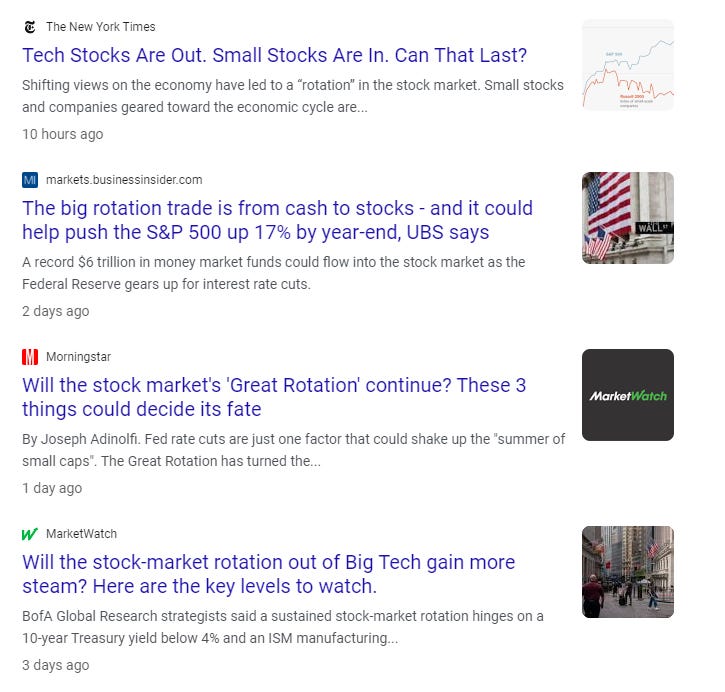As an investor, it’s possible to become too ‘cute’.
I’ve always embraced simplicity over complexity when it comes to investing.
Many investors overthink their investments and end up with 10+ ETFs and mutual funds in a single portfolio.
Overkill? Most likely.
The late Daniel Kahneman famously said, “All of us would be better investors if we just made fewer decisions.”
I truly try and live by that saying.
So of course I stumbled upon this tweet recently:
Lately, you may have heard rumblings or read an article that hits on this “stock market rotation”.
Just google it and this is what you’ll find:
Sounds juicy huh?
Who doesn’t want to be included in the “Great Rotation”?
But for those of us who have built diversified portfolios over the years, this is noise.
We own large companies, small companies, growth/value, international, etc. This is why I’ve preached diversification.
By being diversified, I have exposure to the entire stock market and could care less which sector or company is currently in favor.
Recently, small caps (i.e. a company whose market capitalization is considered small, from $250 million to $2 billion) have exploded to the upside, up over 10% in a month:
Compare this to the S&P 500 Growth companies over the same 1-month window:
Why does this matter?
Many investors were caught flat footed. Large companies, particularly technology companies, have dominated the market over the last decade.
Small caps have underperformed large caps for seven straight, lean years. If you look at the decade before this period, small caps outperformed roughly 50 percent of the time.
Source: Morningstar Direct; Russell 2000 TR USD & Russell 1000 TR USD monthly, total returns (1/1/1984 – 12/31/2023).
What do you think the typical investor has done over the past decade?
Of course they see this underperformance, get pissed, and sell every fund in their portfolio that isn’t large cap tech.
You see this in 401k accounts as well. When investors go to pick their investments (if they didn’t just default to a Target Date fund…), they filter by performance.
Which fund has done the best over the past 1-, 5-, 10-years? I’m going with that one.
But that will always be a losing strategy.
Why?
There is no guarantee that trend will continue. For those that are unfamiliar, Google “the lost decade, stock market” and tell me you only want to be invested in the S&P 500.
Ben Carlson said it well,
I like diversification as a form of risk management because it helps you avoid the extremes. Yes, that means you’ll never be fully invested in the best performer, but it also means you’ll never be fully exposed to the worst performer.
By being diversified, you are positioned to capture the next “great rotation”. I just need to continually add to these positions and grow the balances over time.
Of course, by using this strategy, there will be years when laggards in your portfolio drive you nuts. Anyone who has owned bonds over the past five years knows what I am talking about.
But that’s the beauty of diversification - if you love everything in your portfolio, chances are you don’t have enough diversification.
Disclosure: This material is for general information only and is not intended to provide specific advice or recommendations for any individual. All performance referenced is historical and is no guarantee of future results.
All indices are unmanaged and may not be invested into directly.
All investing includes risks, including fluctuating prices and loss of principal.







